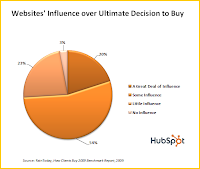 This hopefully tells you something you've known for some time, that nearly all confirmed buyers will eventually make their way to your website (or your competitors) to gather information to help inform their buying decision. And that's not just product-specific data.
This hopefully tells you something you've known for some time, that nearly all confirmed buyers will eventually make their way to your website (or your competitors) to gather information to help inform their buying decision. And that's not just product-specific data.We know from analysis of the marketing and sales funnels that at the beginning of this journey, these prospects are first looking for educational content and thought leadership that first speaks to an understanding of business challenges, how that relates to their specific needs and then provides answers that help solve these challenges. Not until those questions have been satisfied do these prospects seek specific information on the vendor solutions that support these ideas.
This blog has spoken often about the need to have a website that provides compelling (and easily obtainable) content to prospects for each stage of the funnel they are in, as well as for their specific roles/pain points relative to their responsibilities to the overall decision chain. This only further supports that.
If you feel your website is not sufficiently content-optimized, it's not too big an elephant to start the changes needed right now. I'm sure you have sufficient content already in your site copy, your campaign offers and assets, etc. The keys are to get that content organized, updated and targeted, and get it on the site (and searchable). Simple SEO, such as keyword development and creating meta tags for your page titles, descriptions and keywords can be done in a few days. Paid search that supports those keywords can be done in minutes. Create a landing page/s that provide a path for prospects to gain further information from you while exchanging some of their personal data. Ensure that your blog is liked to your site and pump a steady stream of your brilliance into it. Link those posts to your Twitter, Facebook and LinkedIn profiles. It's not difficult. There are prospects who are waiting to hear from you right now...

